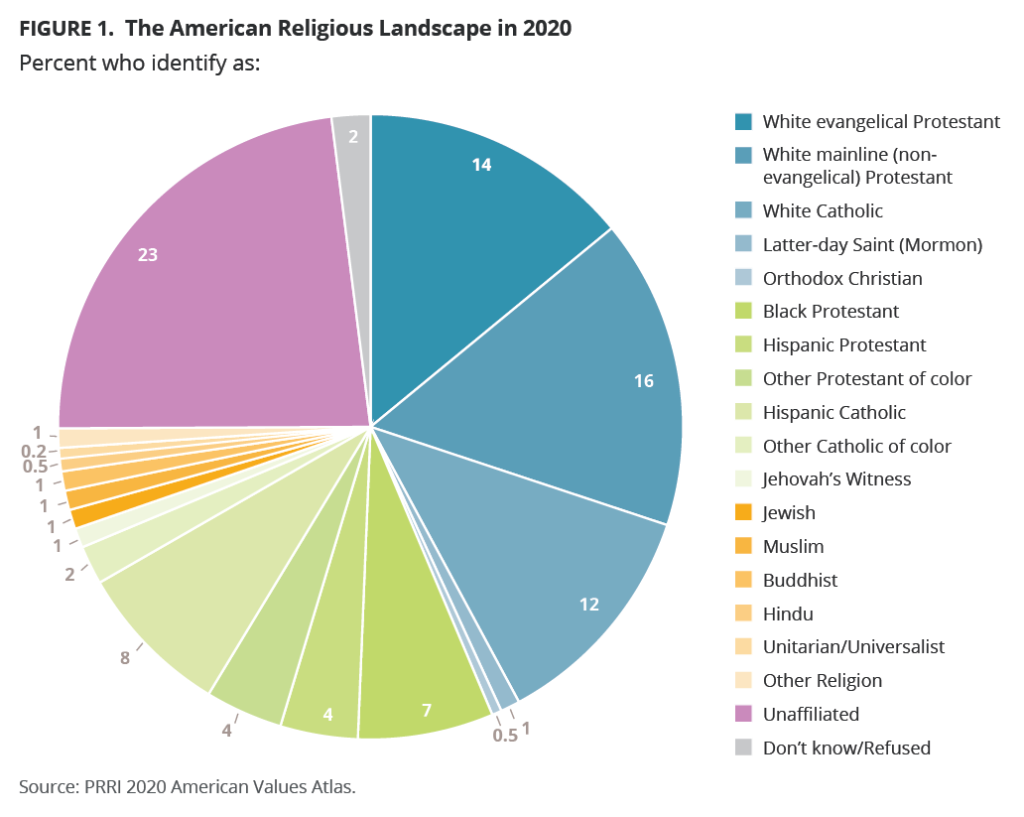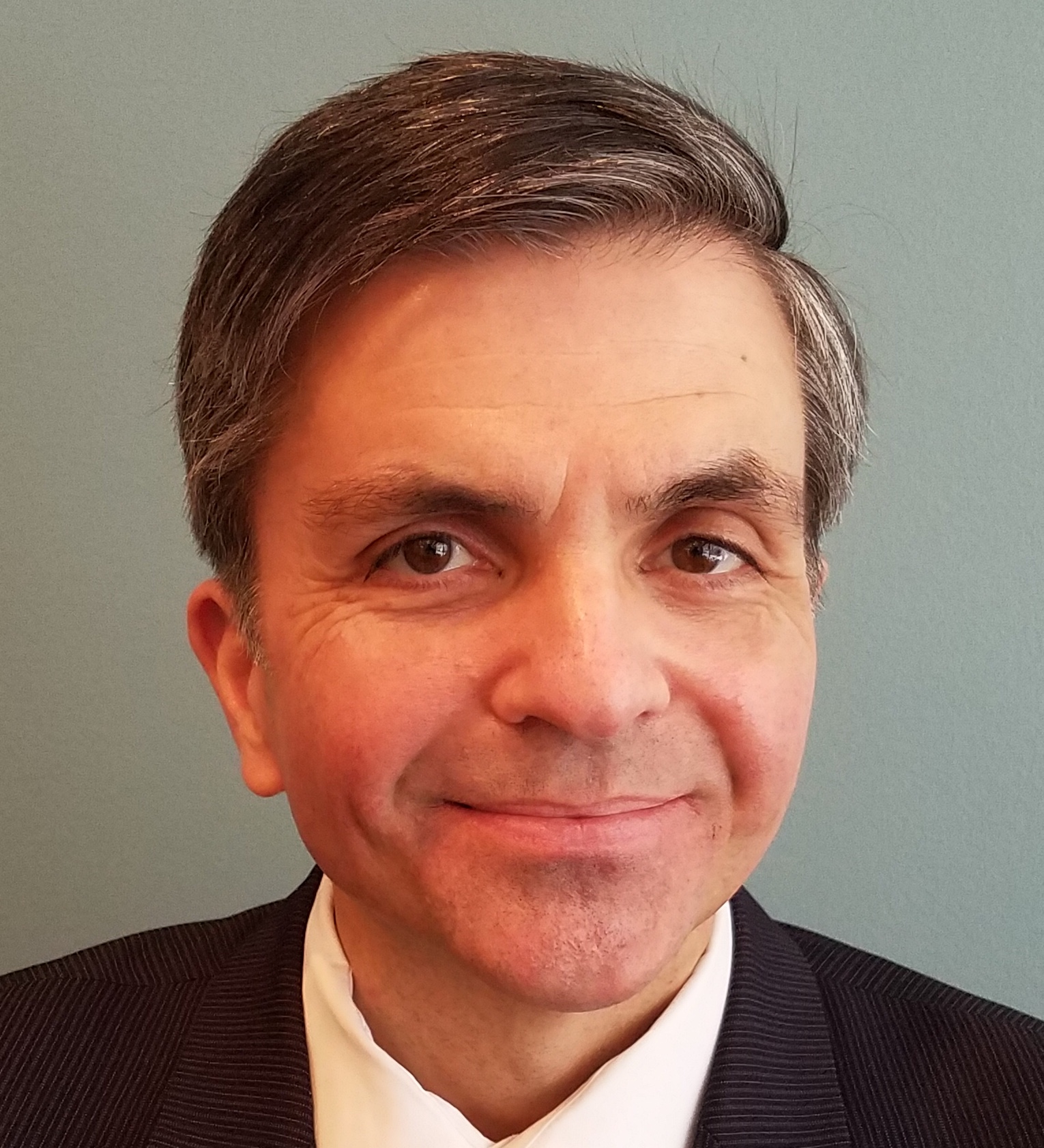There’s much chatter over a new survey showing the decline of USA Christianity has stopped, at least momentarily, with 70% of Americans identifying as Christian. (A 2019 survey found only 65% identifying as Christian.) Religiously unaffiliated Americans are 23%, down from 25% two years before. Other religions comprise less than 7%.
Lots of media have hyped the survey’s claim that white Mainline Protestants are growing and now outnumber white Evangelicals, at 16% versus 14%. It says white Evangelicals have fallen from 23% in 2006, while Mainliners have climbed from 13% in 2016. They were 19% in 2007.
New York magazine harrumphed:
Still, the news that mainliners are growing as Evangelicals decline will be shocking to those who have been told for many years — by gloating Evangelicals as well as by secular conservatives and many nonreligious observers — that liberal Protestantism is “dead” or “dying,” condemned by lax theology and too much tolerance of sinfulness (you know, women having nonmarital sex, using birth control, and having abortions; divorced people remarrying; and LGBTQ people coming out of the closet in defiance of God’s plan).
But the survey counted as Mainline any Protestant not identifying as born again or evangelical. All Mainline Protestant denominations are dropping dramatically in membership and attendance. It’s extremely unlikely that more Americans now identify as Mainline even as those churches implode as fast as ever.
The slight uptick in non born again identifying Protestants is likely comprised mainly of former Evangelicals and nominal Christians who don’t relate closely to any particular tradition. The term evangelical has become increasingly political and there’s no surprise that fewer would tell pollsters they identify with it.
Public Religion Research Institute (PRRI), the survey organizer, specializes in deriding white Evangelicals as political reactionaries while also insisting they are fast becoming extinct. This appraisal typically ignores or minimizes growing numbers of non white Evangelicals and the ongoing institutional and membership collapse of Mainline Protestantism.
According to Religion News Service, PRRI’s chief cited “circumstantial evidence” suggesting “over the last two years in particular, white mainline Protestants seem to have absorbed at least some folks leaving white evangelical and other churches who may have otherwise landed in the religiously unaffiliated camp.”
If significant numbers of Evangelicals are newly associating with Mainline churches, they are not appearing with any force in the latest declining membership and attendance statistics. Instead these new non evangelical Protestants probably more typically are a former Southern Baptist who no longer attends church or drifts through various nondenominational churches that are more experiential than theologically specific.
Adding to the confusion but not acknowledged by PRRI or many media is that many Mainline Protestants identify as born again or evangelical. A United Methodist poll found that 44% of USA church laity were theologically traditionalist. Many if not most of them would profess to be born again. Ironically, many of the supposed Mainline Protestants in the survey are actually not, while at least some of the identified Evangelicals are also Mainline Protestants.
Perhaps PPRI should simply have avoided reference to Mainliners and just delineated between evangelical and non evangelical Protestants. The ongoing de-institutionalization of USA Christianity will make these terms increasingly fluid and less meaningful. People who sporadically attend numerous different churches and practice various online spiritualities while not identifying with any particular tradition will become almost impossible to categorize.
USA Christianity is not collapsing as many have surmised and even hoped. But it is in a state of roiling ferment. The old denominational categories are fast fading. Americans in their increasingly individualized religion more and more define their spirituality by their social media intake, or the podcasts they enjoy, their favorite religious music from satellite radio, the books they download from Kindle, their favored YouTube videos, or the ad hoc prayer or self help group they attend when they’ve time.
The typical American is not so much secularizing as partaking of a wide stream of spiritualities that include Evangelical, Catholic, Charismatic, Prosperity Gospel, New Age and eastern mysticism. The resulting mishmash is not easily detected by a pollster or even described coherently by the subject.
This hybrid of practical religiosities is not new. It’s always existed in America and was especially pronounced after the Second Great Awakening, which electrified and created new Protestant movements while also generating new heterodox sects and practices. Online spirituality and community enables such tendencies to metastasize exponentially.
Pragmatic religion has almost always outweighed more purely theological categories in America. Such practicalities frustrate the purists. But popular churches and religious movements today or yesterday speak in the language of practicality and adaptability.
The more religiously conventional and orthodox are always a minority. But if they are shrewd they will see the current social upheaval as a rich opportunity for building new communities and new institutions that will replace the structural descendants of 18th and 19th century USA Christianity. Those old structures had a remarkable run, creating a civilizational ethic that transformed the world.
So what’s next for America? It’s not secularism, but neither will it be entirely orthodox conventional Christianity. It’ll be an evolving spectrum of largely Christian generated spiritualities, good, bad and in between. Pollsters in 50 years won’t be dividing Americans between evangelical and not. There will be new categories not yet imagined.






Comment by Tom on July 16, 2021 at 5:29 pm
“If significant numbers of Evangelicals are newly associating with Mainline churches, they are not appearing with any force in the latest declining membership and attendance statistics. ”
Bingo! This is just elementary arithmetic. If all the component parts of a whole are declining (as the reporting mainline denominations all are), then the sum cannot increase.
Comment by Dan W on July 17, 2021 at 11:56 am
“Give me that old-time religion. It’s good enough for me!”
(Count me with the born-again, evangelicals. Formerly mainline.)
Comment by Mike on July 17, 2021 at 4:10 pm
Thoughtful article with excellent analysis across a “wide river” that keeps moving and changing – thanks, Mark.
The trend I’m noticing more than anything else these day is what might be called “Self-Identifying Christian Nones”. I’ve had an account on the social site Gab for about a year now (it has picked up perhaps millions of members during this upheaval season of Covid, the presidential election, and the ongoing censoring happening on other social sites like Twitter, Facebook and even You Tube).
Many of those on Gab self-describe themselves as Christians, but not affiliated with any local church, denomination or even theological stream (Calvinist, Arminian, Evangelical, etc.). Quite a few identify and Christian and Q-Anon, with some more deeply ingrained or steeped in the Q-Anon “dogma” of fighting against child sex-trafficking, and waiting for Donald Trump to be victoriously restored to the White House.
As a pastor, it would be easy to write many of these folks off as “cultural Christians” or even as having a “patriotic spirituality,” but many of them post deeply thoughtful spiritual memes and personal experiences, and, as you said above Mark, we need to see in them the “rich opportunity for building new communities and new institutions that will replace the structural descendants of 18th and 19th century USA Christianity.”
Again, good article. It’s a wide and moving spiritual stream out there!
Comment by Todd Capitano on July 19, 2021 at 12:32 pm
What is the point in being a Christian if one does not identify as born again? How would a Christian who does not identify as being born again reconcile their status with John 3? I look back on my pre-regenerate days as a professing Christian with great sadness. No one at PCUSA ever challenged me with John 3. Cultural Christianity is a great deception.
Comment by Phil on July 23, 2021 at 12:45 am
Todd Capitano,
Some of us prefer the translation “born from above” to “born-again”.
Comment by Indy on July 23, 2021 at 12:08 pm
I have to agree that I don’t understand the difference in terminology. I thought to be Christian, period, one had to be “born again”. Please explain.
Comment by Lee D. Cary on July 29, 2021 at 7:11 am
Whether it was due to the the natural evolution of the climate or, perhaps, a meteorite strike, the dinosaurs died out.
Same for the liberal protestant denominations once called the ‘seven sisters’. Including the UMC.
A new thing grows in their places: independent, non-denominational congregations, without the pomp & circumstance of an articulated hierarchy with boards, agencies, bishops, district superintendents, judicial counsels, etc.
It’s a transition not to be feared, but embraced.
Comment by Rev. Dr. Lee D Cary (ret. UM clergy) on September 3, 2021 at 8:37 am
Mark, I’m a bit surprised that you would take a Pew poll at face value.
“There’s much chatter over a new survey showing the decline of USA Christianity has stopped, at least momentarily, with 70% of Americans identifying as Christian. (A 2019 survey found only 65% identifying as Christian.) Religiously unaffiliated Americans are 23%, down from 25% two years before. Other religions comprise less than 7%.”